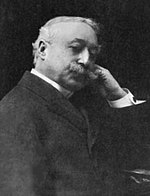Silas G. Pratt, Date of Birth, Place of Birth, Date of Death
TweetSilas G. Pratt
American opera composer
 Date of Birth: 04-Aug-1846
Date of Birth: 04-Aug-1846
 Place of Birth: Addison, Vermont, United States
Place of Birth: Addison, Vermont, United States
Date of Death: 30-Oct-1916
Profession: composer
Nationality: United States
Zodiac Sign: Leo 
About Silas G. Pratt
- Silas Gamaliel Pratt (August 4, 1846 – October 30, 1916) was an American composer.
- A native of Addison, Vermont, he worked in Chicago, New York, and Pittsburgh, in addition to studies and travels in Germany.
- Between 1868 and 1871, he studied under Theodor Kullak, among others, but he suffered a wrist injury during a lesson, which prevented his becoming a professional concert pianist.
- On a later trip to Germany, following a performance of Pratt's works, Franz Liszt gave him encouragement and advice. Pratt is known to have completed at least three operas, one of which he later revised; only two were ever performed.
- His musical allegory, The Triumph of Columbus, was composed for the quadricentennial of Columbus's discovery of the New World, and was performed at Carnegie Hall on 10 October 1892.
- Among his other compositions was a symphony about the sinking of the Titanic, completed in June 1913.
- He was also the first composer to set "America the Beautiful". Pratt is known to have taught piano for a time in Joliet, Illinois.
- In 1895, he was appointed principal of the West End School of Music in New York.
- He later moved to Pittsburgh, and established the Pratt Institute of Music and Art in 1906; he served as the Institute's president until his death in 1916.
- He was buried in Chicago. Pratt is said to have once met Richard Wagner, who called him the "Richard Wagner of the United States"; reportedly, Pratt then responded that Wagner was "the Silas G.
- Pratt of Germany". Other writings by Pratt include a book entitled Lincoln in story : the life of the martyr-president told in authenticated anecdotes.
- published by Appleton in 1901.
- Upton mentions 2 symphonies by an S.G.
- Pratt (a standard abbreviation of Pratt's name) – "No.
- 1, E minor (1870); No.
- 2, A major (The Prodigal Son) (1875)" (dates may be of composition, performance or publication.)
Read more at Wikipedia

